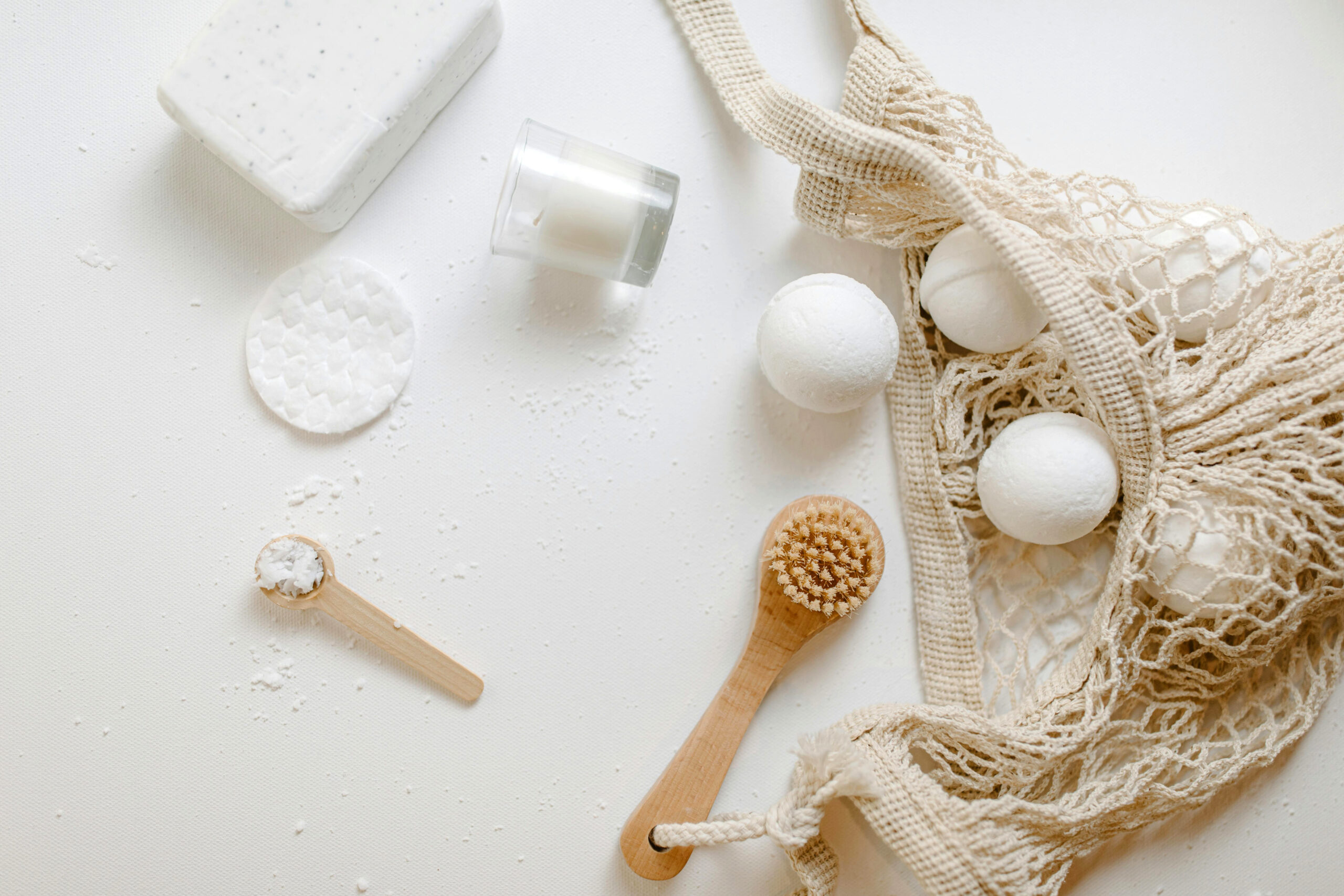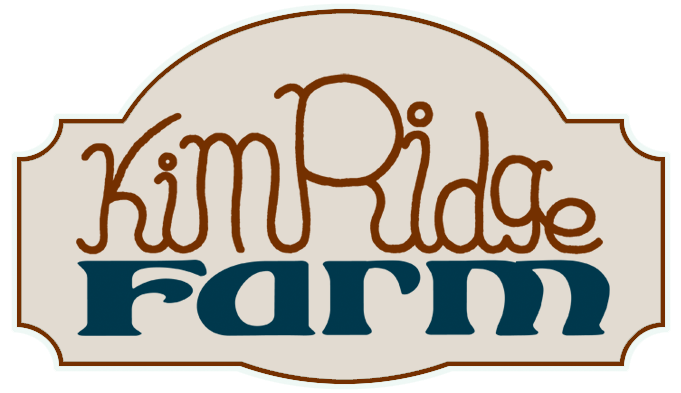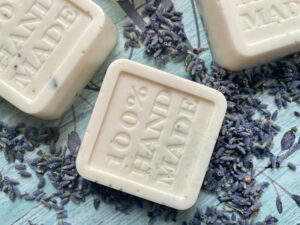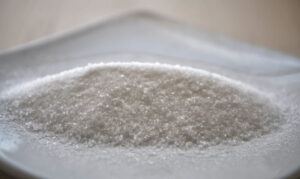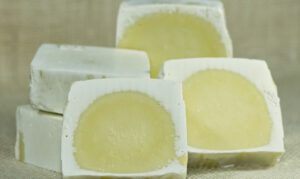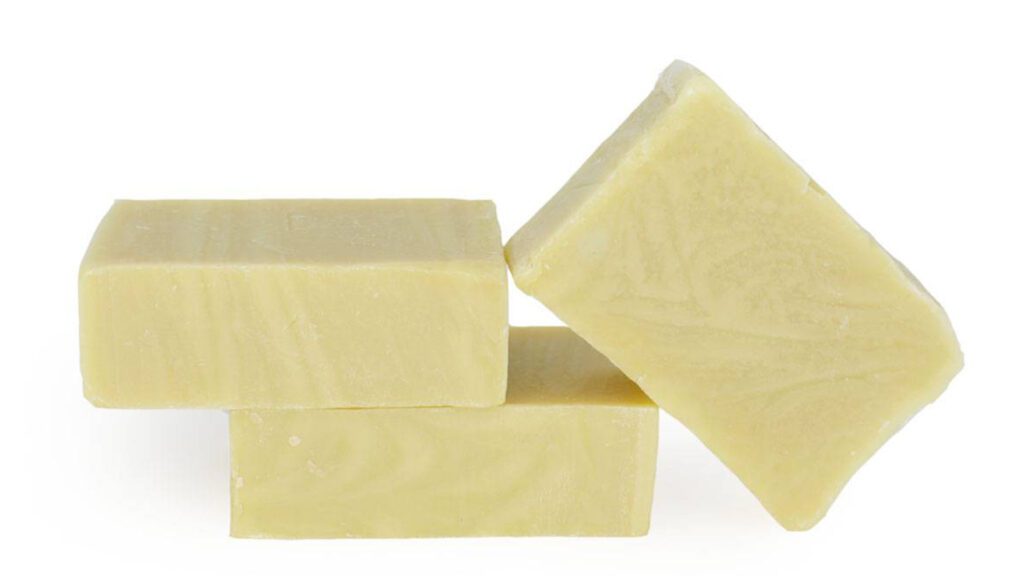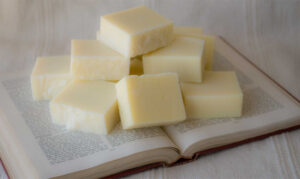The Misunderstood History of Lye Soap
Contrary to popular belief, lye soap is not harsh and won’t burn your skin—in fact, the many lye soap benefits make it ideal for natural skincare. Historically, farmers and homesteaders made soap without precise measurements, which often left behind residual lye that caused irritation. As a result, lye soap developed an undeserved bad reputation.
Why Modern Lye Soap Is a Skincare Game-Changer
Thankfully, modern soap makers now use exact saponification charts, lye calculators, and pure food-grade lye, resulting in a gentle, moisturizing, and therapeutic soap – far removed from the harsh soaps of the past while preserving all of lye soap’s health benefits.
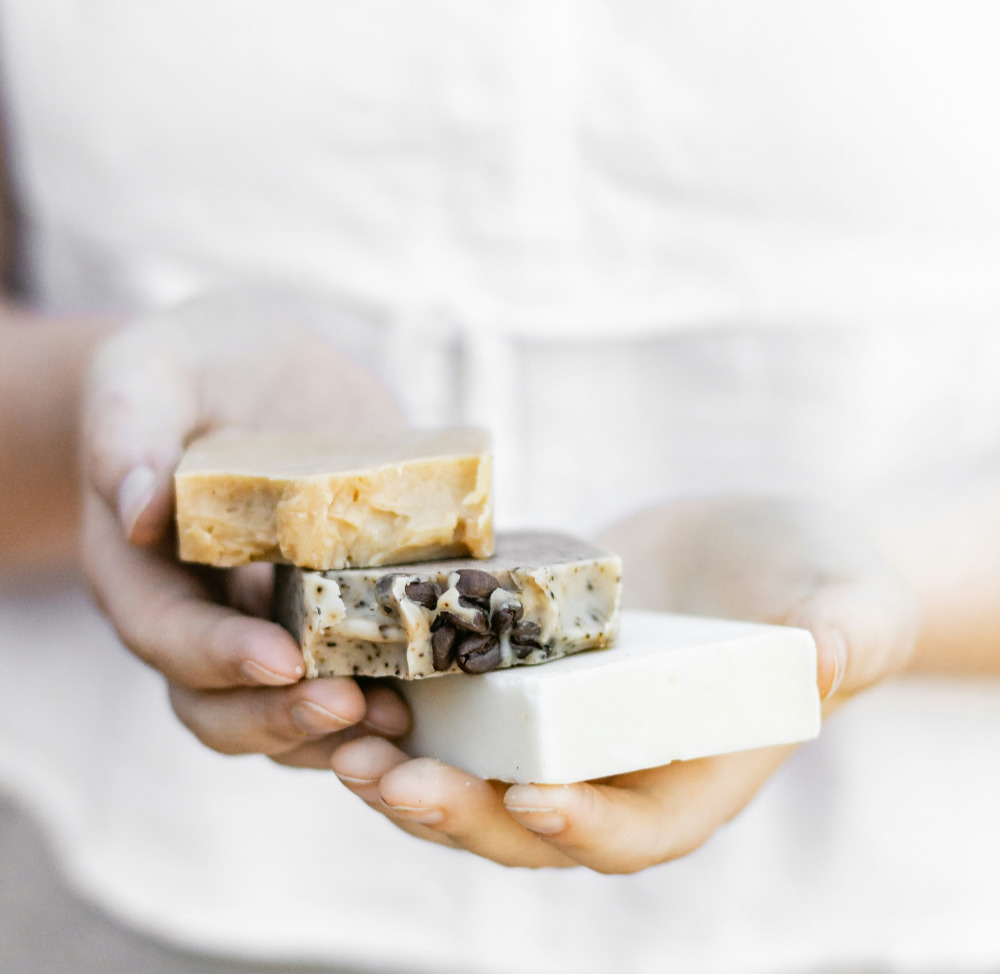
You can find various lye calculators online, such as soapcalc.net or Bramble Berry Lye Calculator.
How Modern Lye Soap Differs from Old-Fashioned Soap
In the past, soap makers leached lye from wood ashes, leading to unpredictable concentrations and harmful contaminants. Additionally, they lacked precise measuring tools, which sometimes resulted in soap that was either too alkaline or too oily. By contrast, today we use 100% pure sodium hydroxide (lye) from trusted suppliers, ensuring no leftover lye or impurities remain in the final product.
Furthermore, modern soap makers follow exact scientific methods to guarantee a perfectly balanced bar. This means that every batch of lye soap is consistent, mild, and packed with nourishing properties.
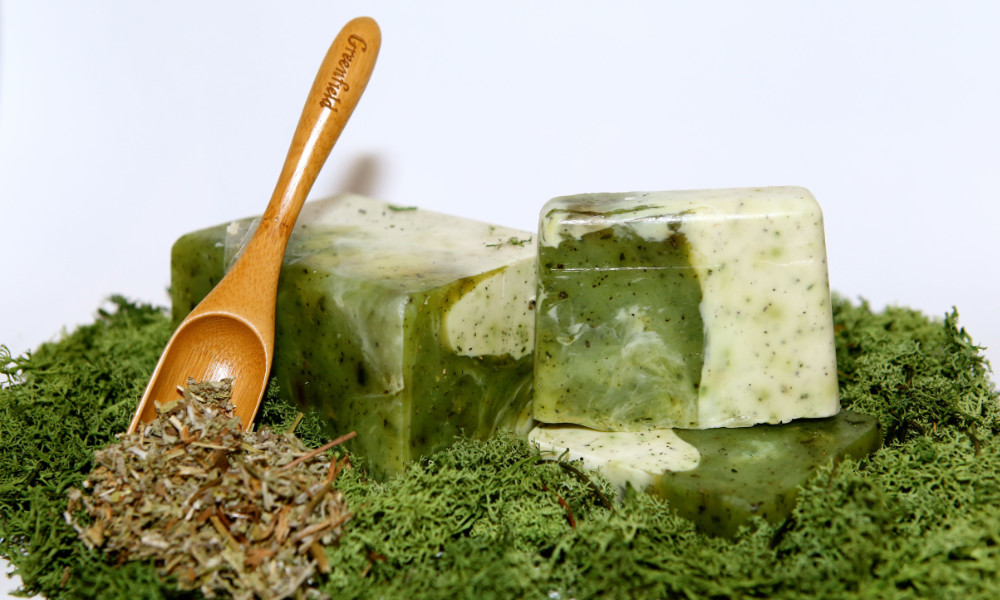
The Science Behind Lye Soap
First and foremost, all true soap is made with lye. Without it, you’re left with a synthetic detergent. Unfortunately, commercial “soaps” are often chemical detergents that clog pores, cause dryness, and irritate skin. They are usually referred as synthetic detergents of syndets for short.
On the other hand, real lye soap is a natural reaction:
Fats + Lye → Soap + Glycerin + Residual Moisturizing Oils
Or, more precisely:
Triglycerides + Sodium Hydroxide → Sodium Stearate (soap) + Glycerin + Residual Triglycerides
Let’s break down these components:
- Sodium Stearate – Not only cleanses and unclogs pores, but also removes toxins (like poison ivy’s urushiol oil).
- Glycerin – A natural humectant that moisturizes skin (unlike commercial soaps, which remove this!).
- Residual Oils – Additionally, these extra fats keep skin soft.
Moreover, modern soap recipes are carefully calculated so that a small excess of fat remains, further enhancing the moisturizing and soothing properties.
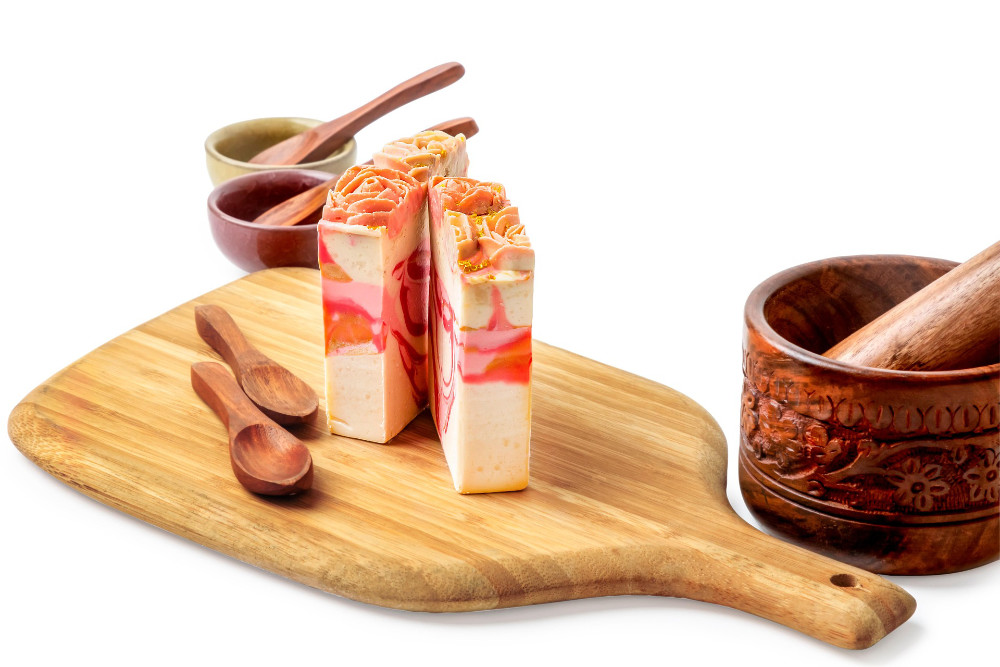
Lye Soap for Healthy Skin & Hair
Top Skin Health Benefits
Gentle Daily Skin Care
- Daily pampering with lye soap cleanses and conditions skin without stripping moisture.
- Unlike commercial soaps that contain sulfates and parabens, lye soap reduces rashes and irritations—no more dry, itchy skin.
Natural Acne & Blackhead Treatment
- Lye soap unclogs pores by removing excess oil and bacteria.
- Dermatologists often recommend medicated lye soap with aspirin, coal tar, zinc, or other additives.
- Balances pH—prevents breakouts and leaves skin radiant.
Balancing Dry and Oily Skin
- Dry skin? Glycerin in lye soap is a humectant. Thus, it attracts moisture from the air to your skin—no need for heavy lotions.
- Oily skin? Lye soap slows overproduction of sebum by avoiding harsh dryness (unlike commercial soaps).
Anti-Aging Properties
- Lye soap is rich in antioxidants. It slows wrinkles and age spots.
- It promotes youthful skin – daily use keeps skin supple.
Eczema, Psoriasis, and Dermatitis Symptom Relief
- Because of the emollient qualities of lye soap, it is recommended for eczema, psoriasis, and dermatitis.
- It relieves itching, irritation, and minimizes the symptoms.
Hair Care with Lye Soap
Gets Rid of Seborrhea & Dandruff
- Lye soap is used by dermatologists to alleviate seborrhea and dandruff.
- Simply washing your hair and affected areas with lye soap reduces flaky skin and irritation.
Promotes Smooth and Silky Hair
- Lye soap is mild and gentle on hair.
- It provides natural oils and glycerin without damaging hair structure.
Lye Soap’s Outdoor Skin Solutions
Sunburn Relief and Prevention
- Lye soap reduces burning when applied before sun exposure.
- Heals burns faster – lather on and keep a little longer to calm inflammation.
Neutralizes Poison Ivy, Oak, and Sumac
- Wash immediately after exposure! It removes urushiol oil to prevent rashes.
- If some time passes after contact, the reaction can still happen. To minimize the reaction severity, wash the area with lye soap as soon as possible. Reapply if needed.
Soothes Bug Bites & Repels Insects
- Lye soap relieves itching – apply to bites for instant relief.
- Natural mosquito repellent – lather on skin before going outside.
- Ant deterrent – place a bar in cabinets to keep pests away.
Hunters’ Secret: Eliminates Human Scent
- Unscented lye soap makes you “invisible” to animals.
- It’s great for hunting or nature watching.
Final Thoughts: Why Choose Lye Soap?
Unlike store-bought detergents, natural lye soap cleanses, heals, and protects skin without harsh chemicals. Whether you struggle with acne, eczema, sunburn, or bug bites, lye soap offers a chemical-free solution.
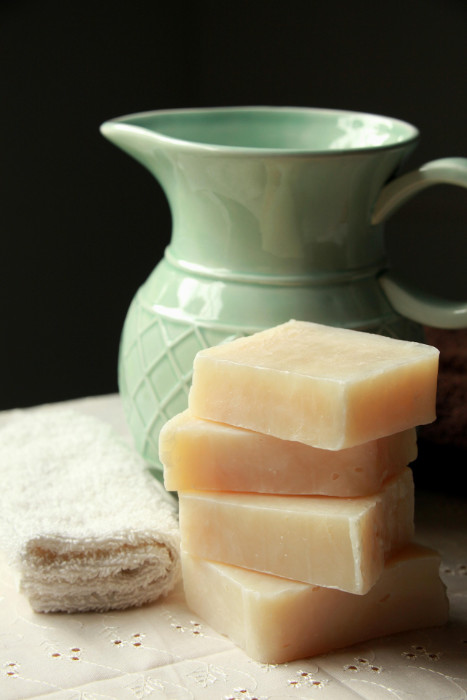
FAQs
Q: Is lye soap safe for sensitive skin?
A: Absolutely! Properly saponified lye soap leaves no residue, making it ideal for eczema, psoriasis, or scleroderma (dry skin).
Q: Does lye soap help with poison ivy?
A: Yes! The sooner you wash with it, the more effectively it removes urushiol oil.
Do you know of other benefits and uses of lye soap?
Have you tried lye soap? Share your experience below!
Want to make your own? Check out our easy lye soap recipe [link].
By now, it should be clear that lye soap is far from the harsh, skin-damaging product many assume it to be. With its deep-cleansing, moisturizing, and healing properties, it’s a must-have for anyone seeking a natural, chemical-free skincare alternative. Whether you’re battling acne, eczema, or just want a gentle daily cleanser, lye soap is a versatile and effective solution. So why not give it a try and experience the benefits for yourself?
